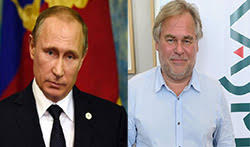Kaspersky Lab Antivirus Software Banned from U.S. Government Computers
 Kaspersky has been one of the many prominent marks within the computer security industry providing antivirus software. In the recent months to nearly two years, Kaspersky has been investigated by the FBI for possible links to Russian security services. Unfortunately, as a result of the investigations, Kaspersky software has been banned for use on U.S. government computers by federal agencies.
Kaspersky has been one of the many prominent marks within the computer security industry providing antivirus software. In the recent months to nearly two years, Kaspersky has been investigated by the FBI for possible links to Russian security services. Unfortunately, as a result of the investigations, Kaspersky software has been banned for use on U.S. government computers by federal agencies.
The concerns that arose of Kaspersky software rooted from the company suspected to have ties to state-sponsored cyberespionage activities. Moreover, The Department of Homeland Security become concerned about Kaspersky's officials and Russian intelligence associations being an issue where there could be communication interceptions transitioning from Russian networks.
Ever since the speculation surrounding an endless media-fest around the recent presidential election and Trump administration, there has been an up-rise in the media and public for Russian dealings in anything stateside. While the Russian association in the election process, whether true or not, the idea has drawn many raised eyebrows from not only civilians but the U.S. government. With ties traced from Kaspersky to Russian intelligence, it doesn't help matters in the public view.
To potentially nip dirty dealings with Russia in the bud, federal agencies have ordered any U.S. government computers using Kaspersky software to cease utilization. After 90 days, unless they are otherwise directed, the agencies utilizing Kaspersky software must remove it.
What has initiated the U.S. ban of Kaspersky software comes out of intelligence agencies where they have information that leads them to believe that Kaspersky software products may be conduits for Russian espionage, something that the U.S. government isn't taken lightly. Surprisingly, at least six federal agencies run Kaspersky in some form on their networks. When it comes to the security of such networks, there may not be an expected awareness of Kaspersky software being used.
So far, the Kaspersky ban order applies only to civilian government networks, which includes agencies like the Defense Department and National Security Agency, who conveniently claim not to use Kaspersky software.
The founder of Kaspersky, Eugene Kaspersky, graduated from a KGB-supported cryptography school and worked in Russian military intelligence. White House cybersecurity coordinator and a former NSA official, Rob Joyce, initiated the move to defining the Russian spy agencies as "an unacceptable risk," as he said at the Billington Cybersecurity Summit in Washington this week.
Putting a slight wrench in the inner workings of the U.S. government's move to ban Kaspersky is the overall public's perception of the ban due to possible Russian intelligence ties. Fundamentally, the public hasn't seen any evidence of wrongdoing by Kaspersky. Though, there is such a thing as back doors where intelligence-community rumblings could amass, which is part of the premises of the ultimate decision to ban Kaspersky software in the first place.
The backlash of a Kaspersky software ban within the government is starting to have growing consequences. Just last week, Best Buy said it would stop selling Kaspersky products because of fearing the ties with the Russian government. Moreover, The Department of Homeland Security boasts that it has taken "a significant step forward in improving our national security and protecting against such vulnerabilities on federal systems."
There is no doubt that Kaspersky's reputation is damaged on the front of the U.S. The potential backlash has yet to be seen as there could be a movement to discontinue use of Kaspersky software outright in the U.S. For now, at least we know that the U.S. government is serious about severing any known ties with Russian intelligence, even when it comes to antivirus software.